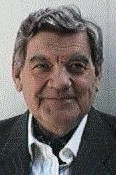 Профессор
Ханс Зеттерберг
(Hans
Zetterberg)
– известен в Швеции, ряде Европейских государств и США как социолог, долгие
годы работающий в области изучения общественного мнения, ценностей массового
сознания, потребительского поведения, деятельности средств массовой
информации и в смежных областях. Он преподавал в Университете Стокгольма, в
Коламбийском Университете в Нью-Йорке, в Университете штата Огайо и других
изестных вузах. Профессор
Ханс Зеттерберг
(Hans
Zetterberg)
– известен в Швеции, ряде Европейских государств и США как социолог, долгие
годы работающий в области изучения общественного мнения, ценностей массового
сознания, потребительского поведения, деятельности средств массовой
информации и в смежных областях. Он преподавал в Университете Стокгольма, в
Коламбийском Университете в Нью-Йорке, в Университете штата Огайо и других
изестных вузах.
Им опубликовано
множество книг и статей, он широко известен как публицист и редактор
массовых изданий, постоянно выступает на шведском радио и телевидении,
консультирует различные шведские и международные фирмы. В настящее время он
уделяет значительное внимание развитию кросс-культурных исследований
ценностей, участвует в ряде международных, глобальных проектов.
Ханс Зеттерберг -
почетный доктор ряда университетов и член многих шведских и международных
научных обществ. В 1986-88 – он был Президентом Всемирной Организации
Исследователей Общественного Мнения (WAPOR).
В 1999 году
профессор Х. Зеттерберг был награжден
WAPOR
почетной премией
Helen S.
Dinerman.
В его выступлении после получения награды он кратко рассказал о своем опыте
изучения общественного мнения и немного - о совместной работе с
Джорджем Гэллапом, с которым
его связывали многолетние дружеские отношения. Профессор Зеттерберг любезно
разрешил нам разместить на нашем сайте соответствующий фрагмент его
выступления.
Борис
Докторов
…The
were strong, flamboyant, individualists working in the private sector and
had names such as ..Gallup…
…At a
later date George Gallup
(or Ted as we called him) became my friend. I learned much from him. His
innovations and insights were never packaged as "research products" and
licensed to others. He gave them away to his friends around the world. If
there is such a thing as American intellectual imperialism - and the French
are not alone in believing so - it has a very kind face. To me American
intellectual imperialism is the Rockefeller tour and Dr. Gallup's
generosity.
…In the 50 years that I have
been in polling or close to polling in some capacity or another, the nature
of the enterprise has changed. We have had much more than technical changes.
In the beginning the
pollsters were driven by an ambition to bring the views of the public to the
attention of everybody, particularly the politicians. Of course, Gallup did
not think that the politicians were constitutionally bound to follow public
opinion as revealed in his polls. But he felt that they were morally obliged
to do so.
The first generation of
pollsters used the rhetoric of the French and American Revolutions. In
democracy the people is the ruling class. In democracy politicians are the
servants of people, not their lords. The source of political actions and
programs were found in the general public. Gallup and his generation of
pollsters believed that the public's views were loaded with political
wisdom, and that a poll was the key to unlock it.
A critical task for the
pollster was to ask questions revealing the public's concerns rather than
the pollster's concern. Gallup solved this in the late 1930s by regularly
asking "What is the most important problem facing the country today?" He did
not define the problem, his respondents did.
With this approach it was
natural that newspapers became sponsors of the polls. The freedom of polling
had a tentative protective umbrella in the academic freedom of the
universities but found its main umbrella in the freedom of the press.
The
early pollsters' view of democracy was challenged from many quarters as too
simple-minded. The Austrian-American economist
Joseph Schumpeter had
formulated a serious alternative. The sources or initiatives of political
actions are normally found, not in the general public, but in the various
elites or parties that compete for the driver's seat of the state. This
notion fitted particularly the European scene where we had the landed
aristocracy defending privileges, the clergy guarding moral values, the
agrarians with protectionism on their agenda, the industrial and business
elites promoting free trade, and strong labor movements demanding welfare
rights and a greater share of the national patrimony. When a country becomes
democratic the public becomes the jury in these struggles, and the public
decides which elite or party is to rule. The pollsters give a voice to this
jury of the public. However, it is not the jury's ideas that are polled and
voted on, but the ideas of the various elites.
www.pseudology.org |